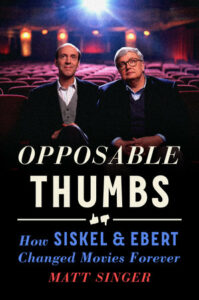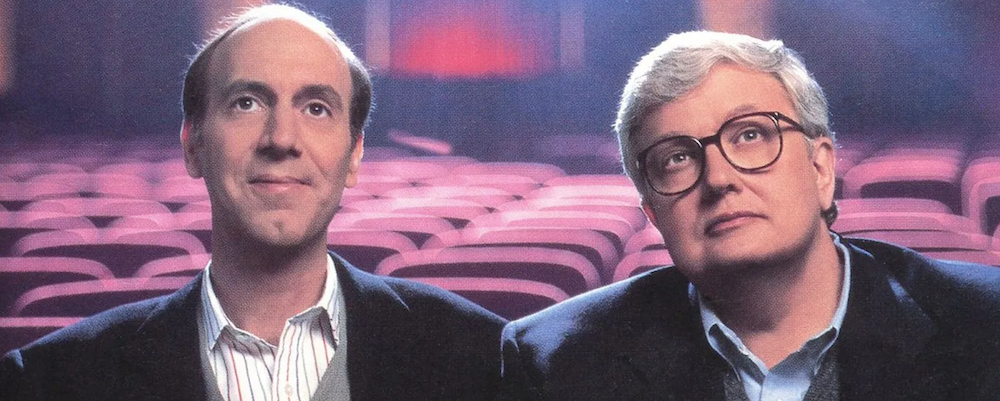If you grew up in Chicago, as I did, and if you’re passionate about movies, as I am, then you certainly know the names Gene Siskel and Roger Ebert. And if you do, then please ask Santa very nicely for a copy of the wonderful new book by Matt Singer, Opposable Thumbs: How Siskel & Ebert Changed Movies Forever.
 Siskel and Ebert were film critics for the Chicago Tribune and Chicago Sun-Times respectively, starting in the late 1960s. Their fierce competition became legendary as they battled each other for scoops and readers, so imagine their reaction when the local PBS station decided the two rivals should come together and co-host a movie review show in 1975.
Siskel and Ebert were film critics for the Chicago Tribune and Chicago Sun-Times respectively, starting in the late 1960s. Their fierce competition became legendary as they battled each other for scoops and readers, so imagine their reaction when the local PBS station decided the two rivals should come together and co-host a movie review show in 1975.
Something clicked, eventually, and for nearly 25 years, Siskel and Ebert became the dominant voice of American popular film criticism—their trademark “thumbs up” or “thumbs down” verdict literally could make or break any new Hollywood release. They quickly burst out of Chicago into national syndication, appearing regularly on talk shows and becoming genuine celebrities in the process.
Singer, editor of ScreenCrush.com, is an unabashed Siskel and Ebert fan, having grown up watching and reading the two critics (“By the age of thirteen, Siskel & Ebert was appointment television for me.”).
He spent considerable time interviewing their widows—Siskel died of brain cancer in 1999 and Ebert lost a battle to cancer in 2012—and key staff members from the various incarnations of the show.
The result is a detailed, bighearted narrative of how these two rivals gradually bonded over a deep passion for film and their definitive stamp on Hollywood over the course of more than 3,000 joint movie reviews.
They seemed like the original Odd Couple. Ebert grew up in the prairie of central Illinois, lived in South Africa for a year and later pursued a Ph.D. before dropping out to be a general assignment reporter at the Chicago Sun-Times. He was made the film critic within the year. He was 24.
Siskel, orphaned as a child, went to Culver Military Academy and then graduated Yale University with a degree in philosophy. He entered journalism as a lark and soon found himself at the Chicago Tribune, becoming film critic at the age of 23.
As Singer details, the two critics squabbled over just about everything. Would it be Siskel & Ebert or Ebert & Siskel? Who would sit next to Johnny Carson when they visited The Tonight Show? Which one got the preferred seat on an airplane? When following a formal script, they each counted the words to make sure neither was being slighted.
In those pre-cancel-culture days, Siskel regularly cracked fat jokes, while Ebert couldn’t resist references to “the bald guy.” Siskel loved to play practical jokes on his cohort, while Ebert never missed an opportunity to remind folks that he was the only film critic to ever win the Pulitzer Prize.
Singer walks us through the early days of the Chicago PBS production, where taping a 30-minute broadcast could take as long as 10 grueling hours. These two hardcore newspapermen had to learn the new medium of television and the transition was not always smooth. But they figured it out eventually and, well, you know the rest of the story. By the 1980s, Siskel and Ebert were everywhere.
‘Opposable Thumbs’ is a truly great book, one that I’ve been waiting for someone to write ever since Ebert died a decade ago.”
As a bonus for hardcore movie lovers, Singer includes an appendix highlighting some of the more obscure films Siskel and Ebert championed on their broadcast over the years, so-called “Buried Treasures.”
The list includes some of my favorites: The Silent Partner (1976), Diva (1981), The Official Story (1985), Monsieur Hire (1989), Brother’s Keeper (1992), and Living Out Loud (1998). Good stuff.
Siskel and Ebert came of age in the late 1960s, as the “New Hollywood” was taking over with a whole wave of exciting films to experience. Gene and Roger were our guides and I don’t think they ever led us astray. Film criticism today—spouted by online wannabes—pales in comparison.
Opposable Thumbs is a truly great book, one that I’ve been waiting for someone to write ever since Ebert died a decade ago. It turns out that we were waiting for Matt Singer to take up the challenge, and he delivers on every level, on every page.
And, yes, if Siskel and Ebert were still alive, no doubt that they would be going through the book, page by page, carefully counting the words, making sure that neither one was getting more coverage.
They needn’t worry. In Matt Singer, they’re in good hands, thumbs and all.
